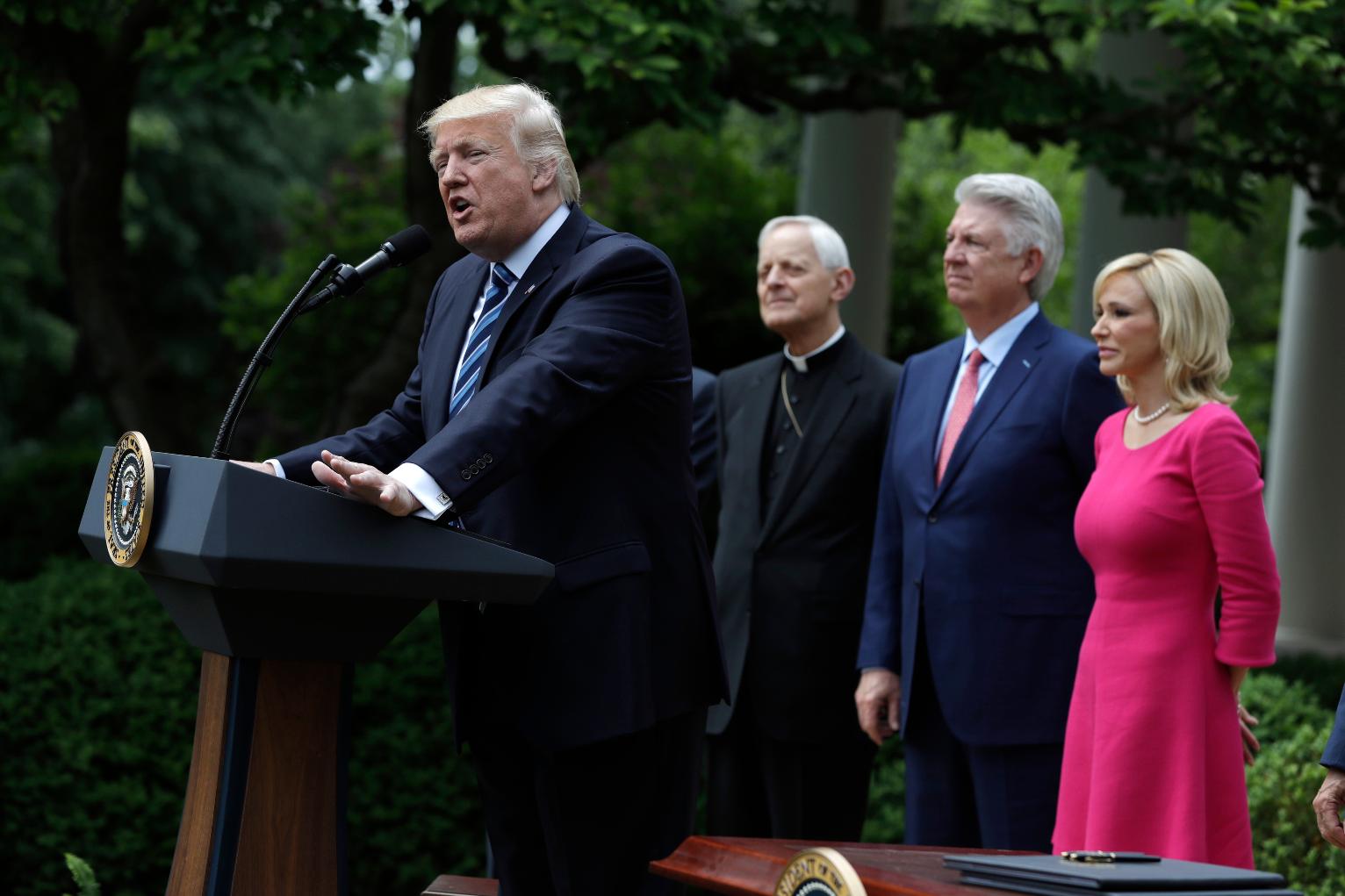President Trump signed an executive order “promoting free speech and religious liberty” on Thursday. The final version of the order addresses two issues. First, it instructs the Internal Revenue Service to “not take any adverse action against any individual, house of worship, or other religious organization” that endorse or oppose candidates from the pulpit, which is currently outlawed by a provision typically referred to as the Johnson Amendment. “We are giving churches their voices back,” Trump said during a ceremony in the Rose Garden. Second, it instructs the Departments of Treasury, Labor, and Health and Human Services to consider amending regulations in the Affordable Care Act that require most employers to cover contraception in employee insurance plans. A number of religious non-profit organizations have been litigating their objections to this requirement. READ THE PRESS RELEASE HERE
The order directs the government “to vigorously enforce Federal law’s robust protections for religious freedom.” It’s a first step toward fulfilling Trump’s campaign promises to social conservatives, but the order is much less aggressive than many religious-liberty advocates had hoped. In February, a supposed draft of an executive order on religious issues was leaked to The Nation. That version—reportedly written by a staffer with the D.C. office of the First Liberty Institute, a Texas law firm that focuses on First Amendment issues—contained provisions designed to protect religious organizations and individuals who speak out against same-sex marriage, transgender identity, and pre-marital sex. It was a menu of sorts, a list of possible issues Trump could address from the Oval Office early in his tenure as president. While Trump has earned the support of a number of high-profile religious conservatives, others are deeply unhappy with the president’s first big move on what they see as religious-liberty issues.
“Evangelicals feel right at home in the @WhiteHouse.”
“Mr. President, we’re going to be your most loyal friends,” said Robert Jeffress, another Texas megachurch pastor who attended the dinner. “We’re going to be your enthusiastic supporters. And we thank God every day that you’re the president of the United States.” Another attendee, the former Liberty University Vice President Johnnie Moore, tweeted that it was “truly an amazing evening. Evangelicals feel right at home in the @WhiteHouse.”
As details about the executive order circulated on Wednesday night, though, many religious conservatives did not feel as pleased with President Trump. On Twitter, the National Review columnist David French called the order “total weaksauce” and a “sop to the gullible.” Russell Moore, the head of the public-policy arm of the Southern Baptist Convention, told me in a message on Thursday morning that “I am hoping that the draft we are seeing this morning is not the entire project, and that more will be forthcoming.” And on Ryan Anderson, a scholar at the Heritage Foundation who works on religious issues, called the new order “woefully inadequate.”
These conservatives argue that the new order doesn’t accomplish much. Take Trump’s action on the Johnson Amendment. While overturning the prohibition on pastors endorsing or opposing candidates from the pulpit would require an act of Congress, the IRS has flexibility in what it chooses to enforce. In the order, the administration instructed the agency to “exercise maximum enforcement discretion of the prohibition.” But that language may be misleading: The IRS already enforces the provision extremely rarely, even when pastors have mailed in tape recordings of potentially law-violating sermons in the hopes of provoking the agency. “Trump seems to have a fixation on the Johnson Amendment, but thatʼs not the concern of people who have been talking about religious liberty for the past several years,” Anderson said.
The “executive order is just the beginning … it can show where his heart is.”
Tim Schultz, the president of the First Amendment Partnership, which works with legislators at the state and national level on religious-liberty issues, said the conservative reaction to the order would be mixed, especially because it leaves out protections for those who object to same-sex marriage. “Many will be disappointed that this signals a lack of will by the administration to expend political capital in this context,” he wrote in an email on Thursday morning. “Others want to see this addressed with great political care … and they will see an opportunity in this omission.” On the Johnson Amendment guidance, he wrote that “there could well be unintended consequences that are bad for faith communities.” This might include the further politicization of houses of worship or the flow of lobbying dollars into religious organizations.
At least some seemed to be ready, as Jeffress said when he opened spoke to his fellow evangelicals in the White House on Wednesday night, to be Trump’s most loyal friends, no matter what.
Source: Emma Green, theatlantic.com
 Listen Online
Listen Online Watch Online
Watch Online Find a Station in Your Area
Find a Station in Your Area









 Listen Now
Listen Now Watch Online
Watch Online
